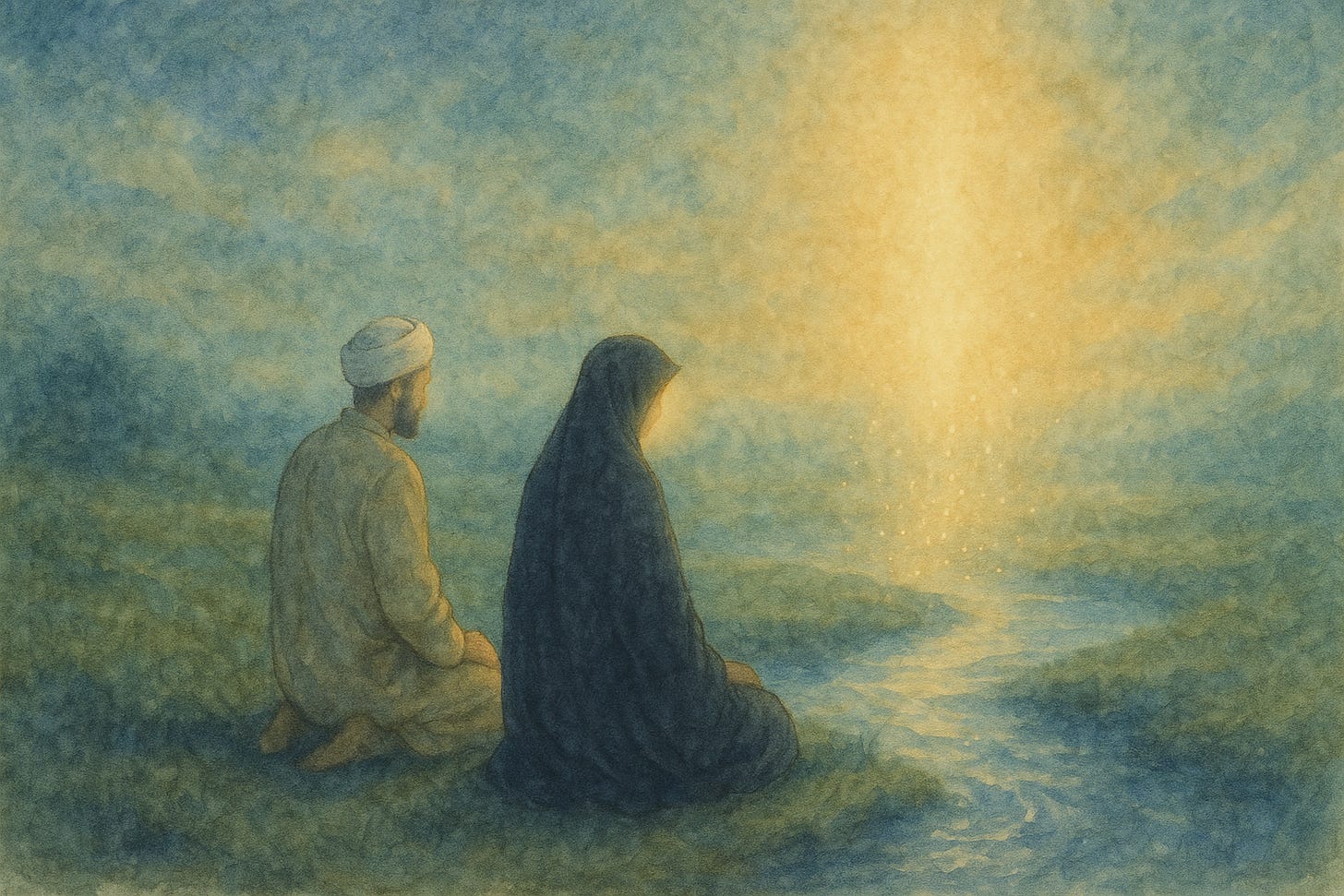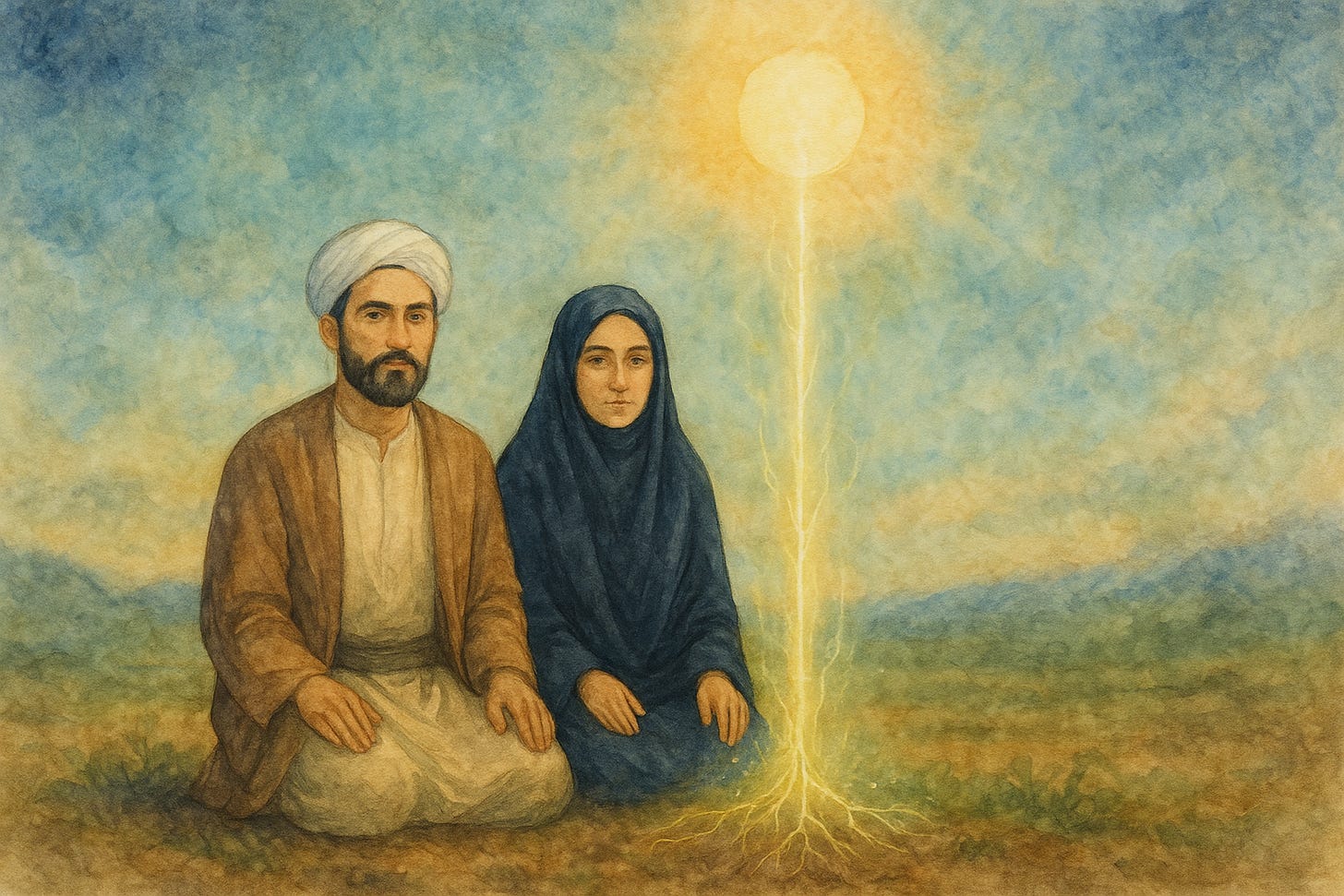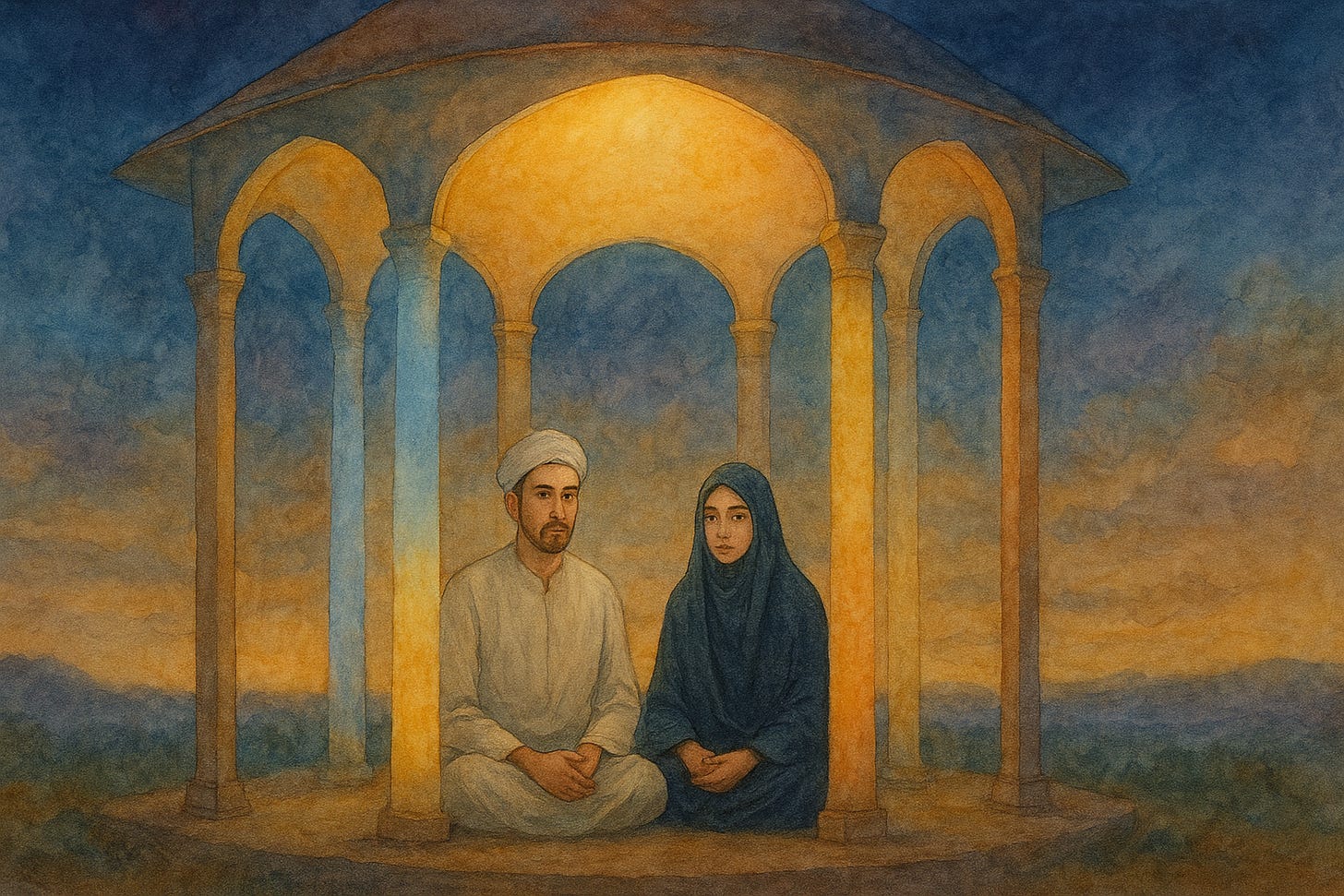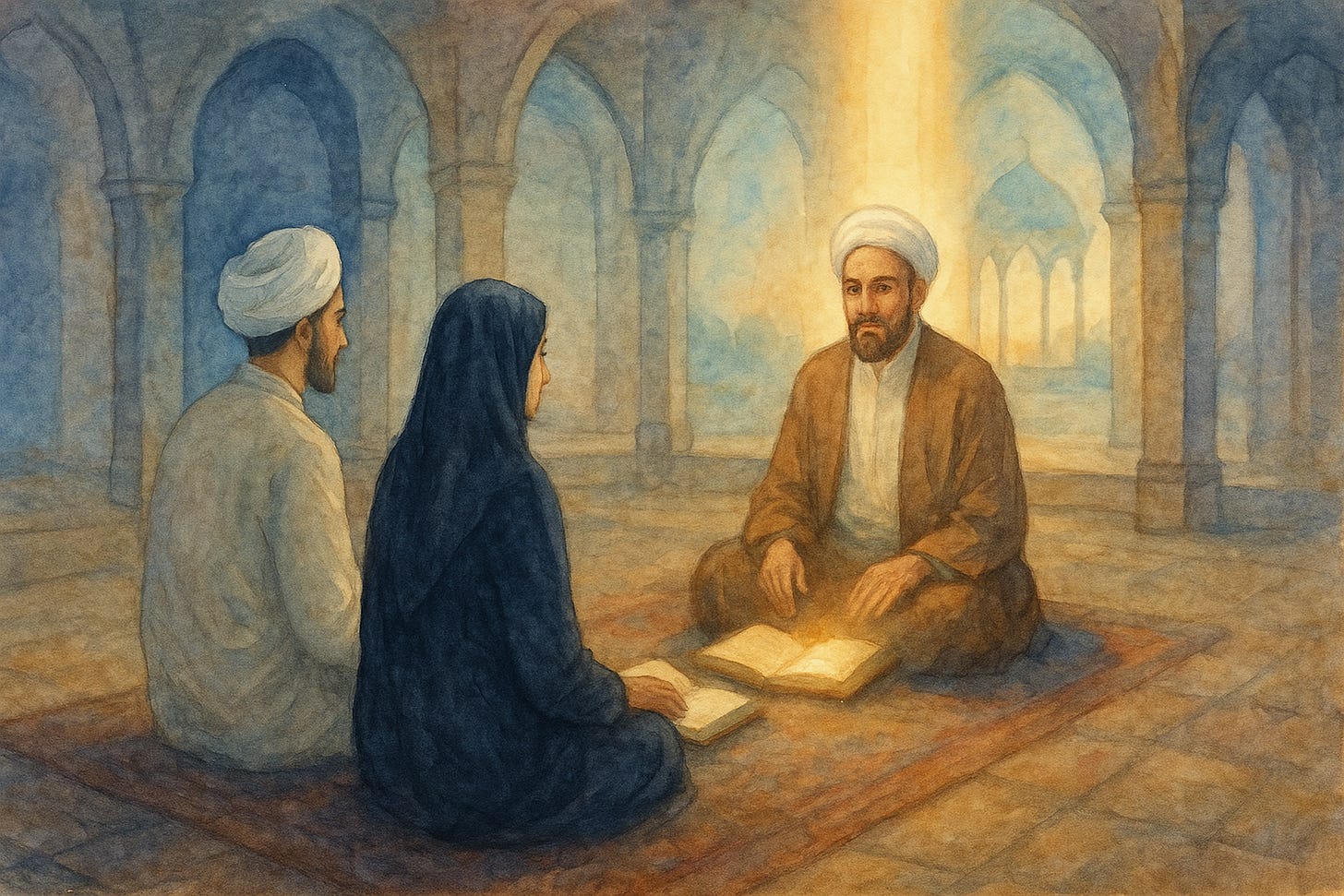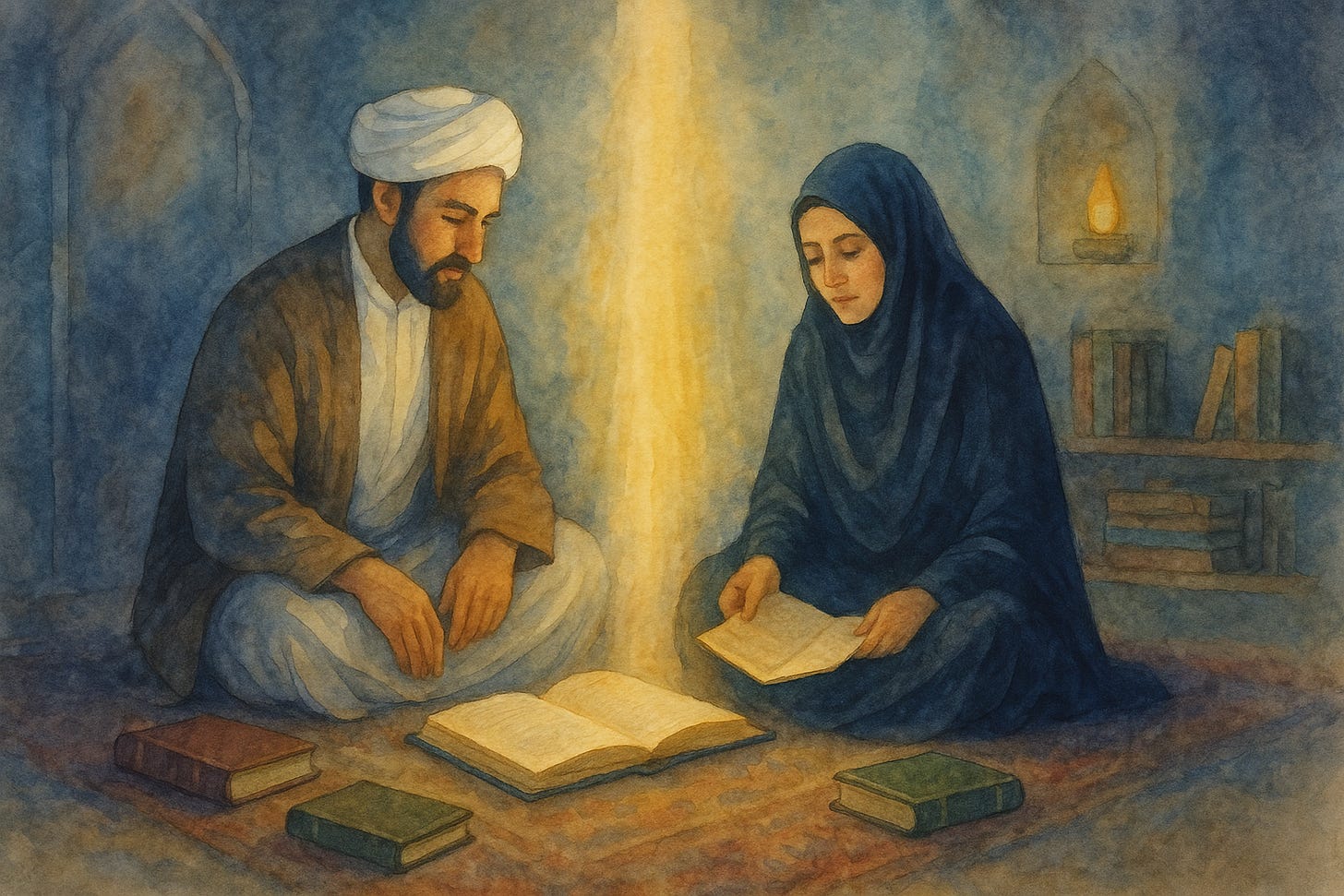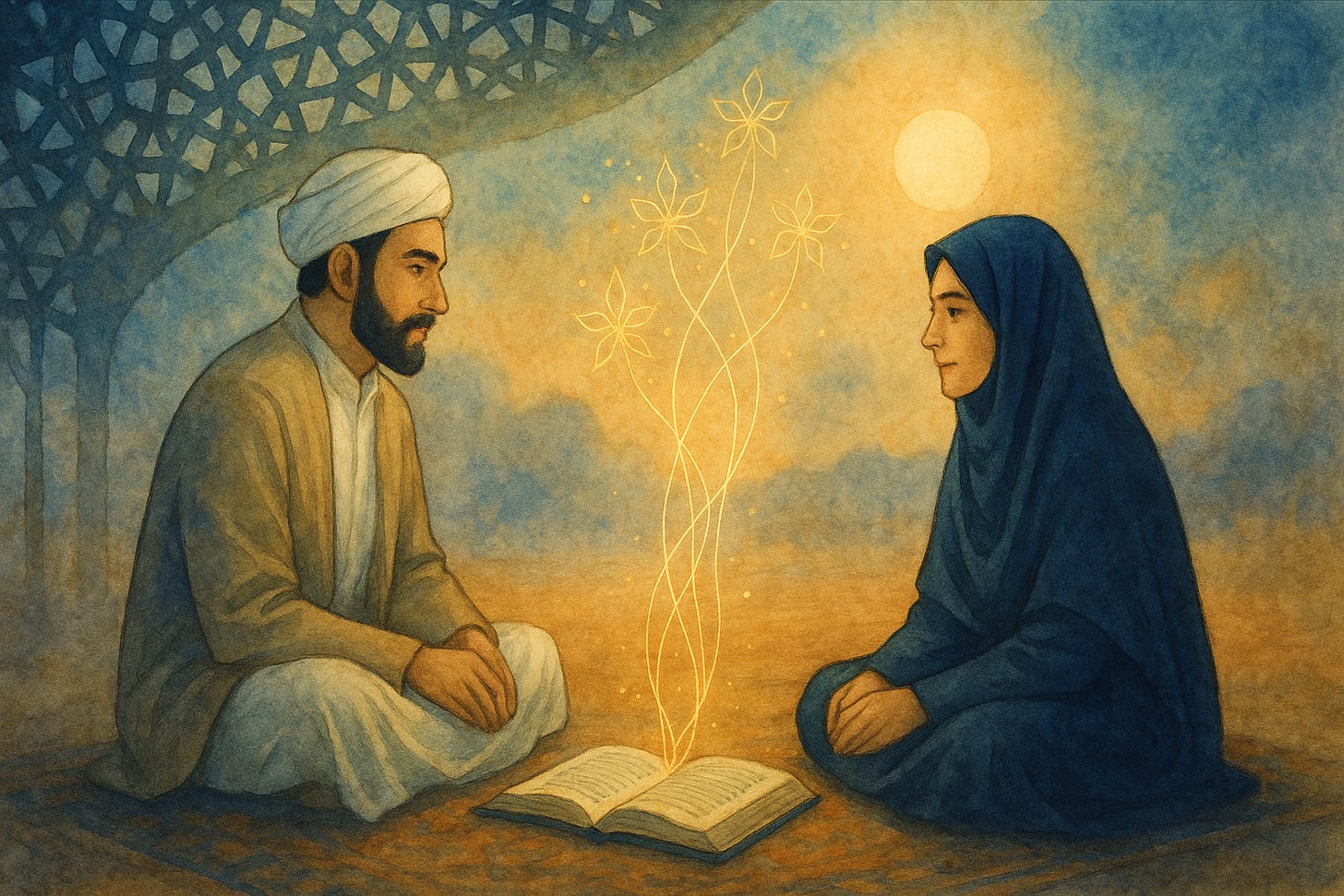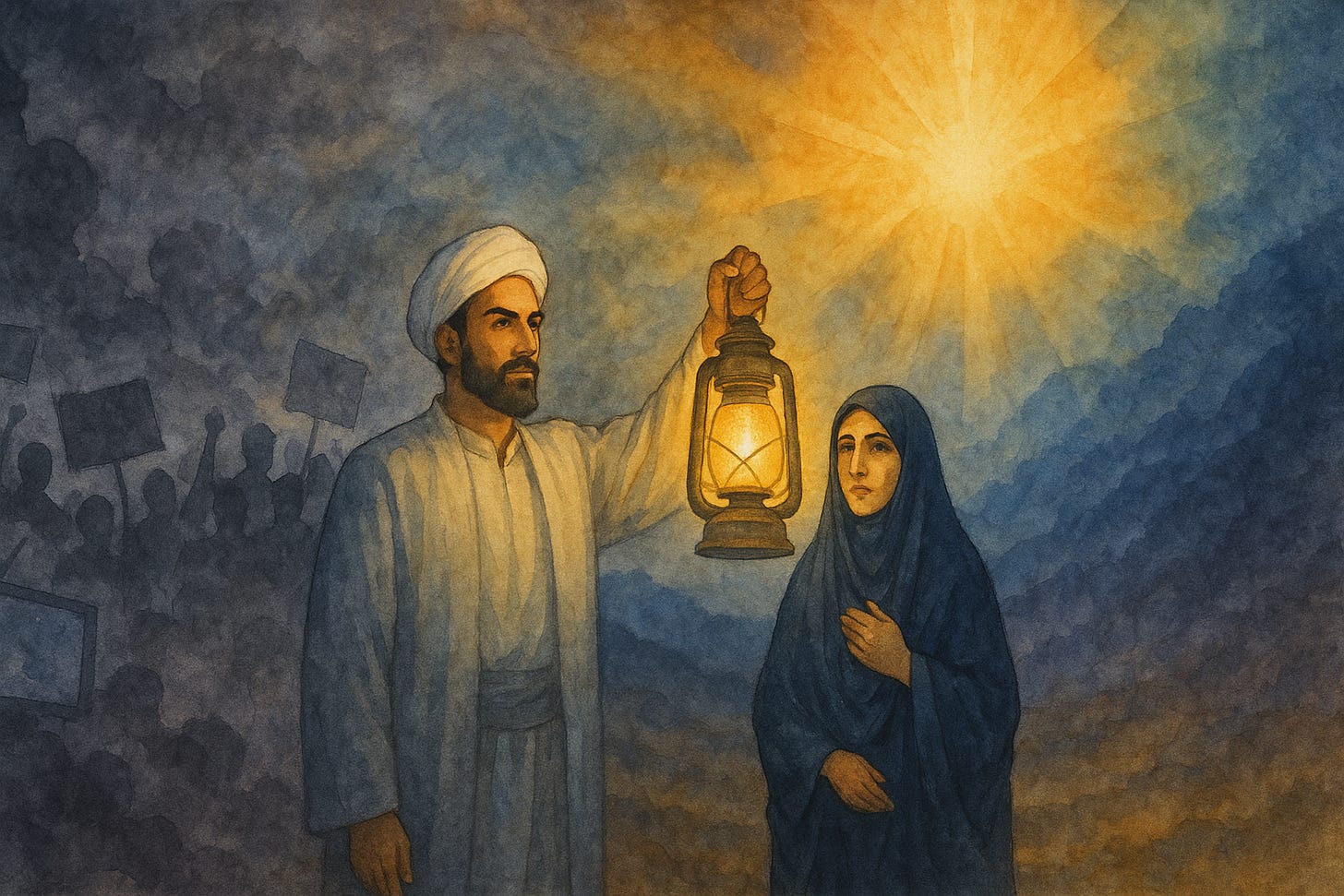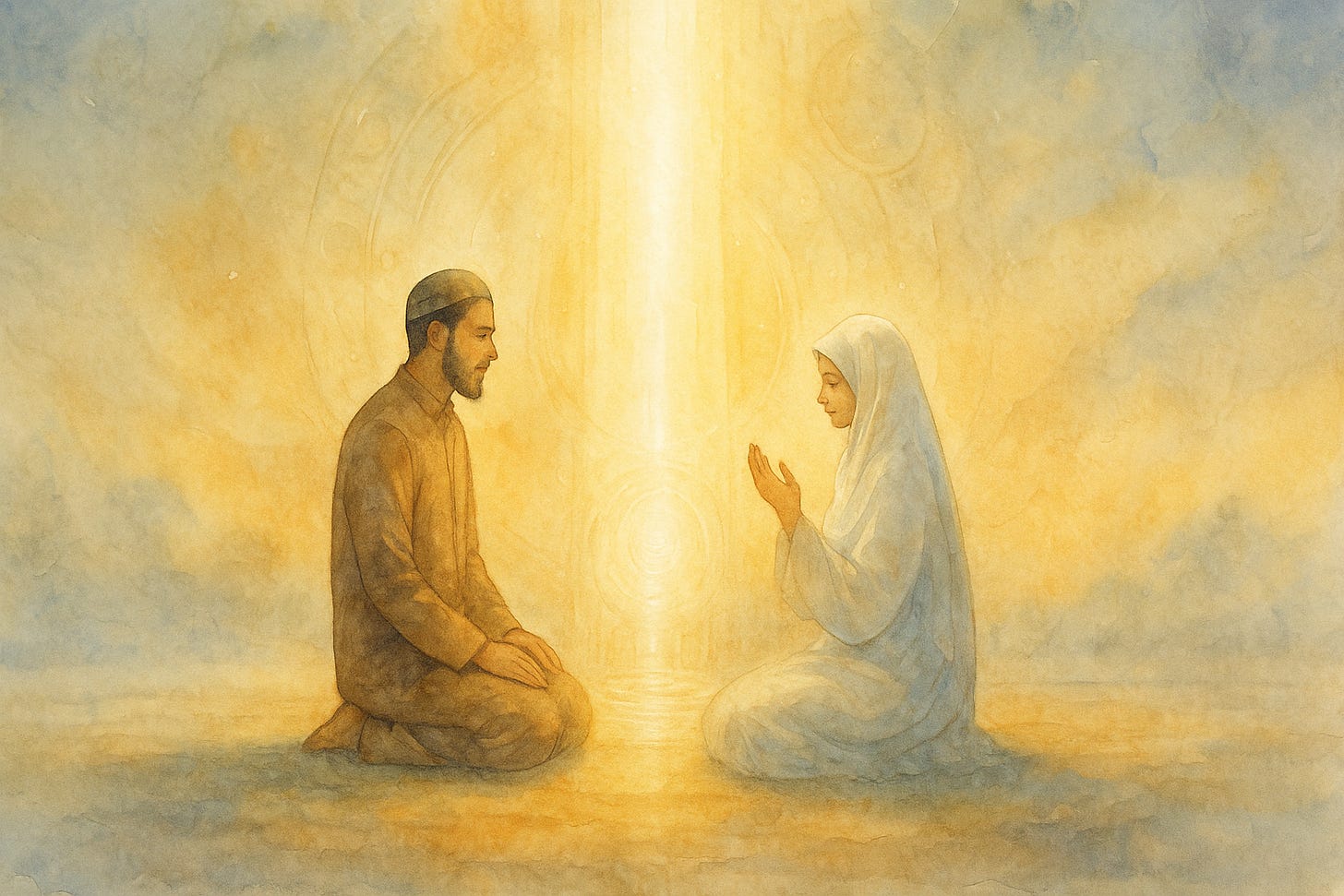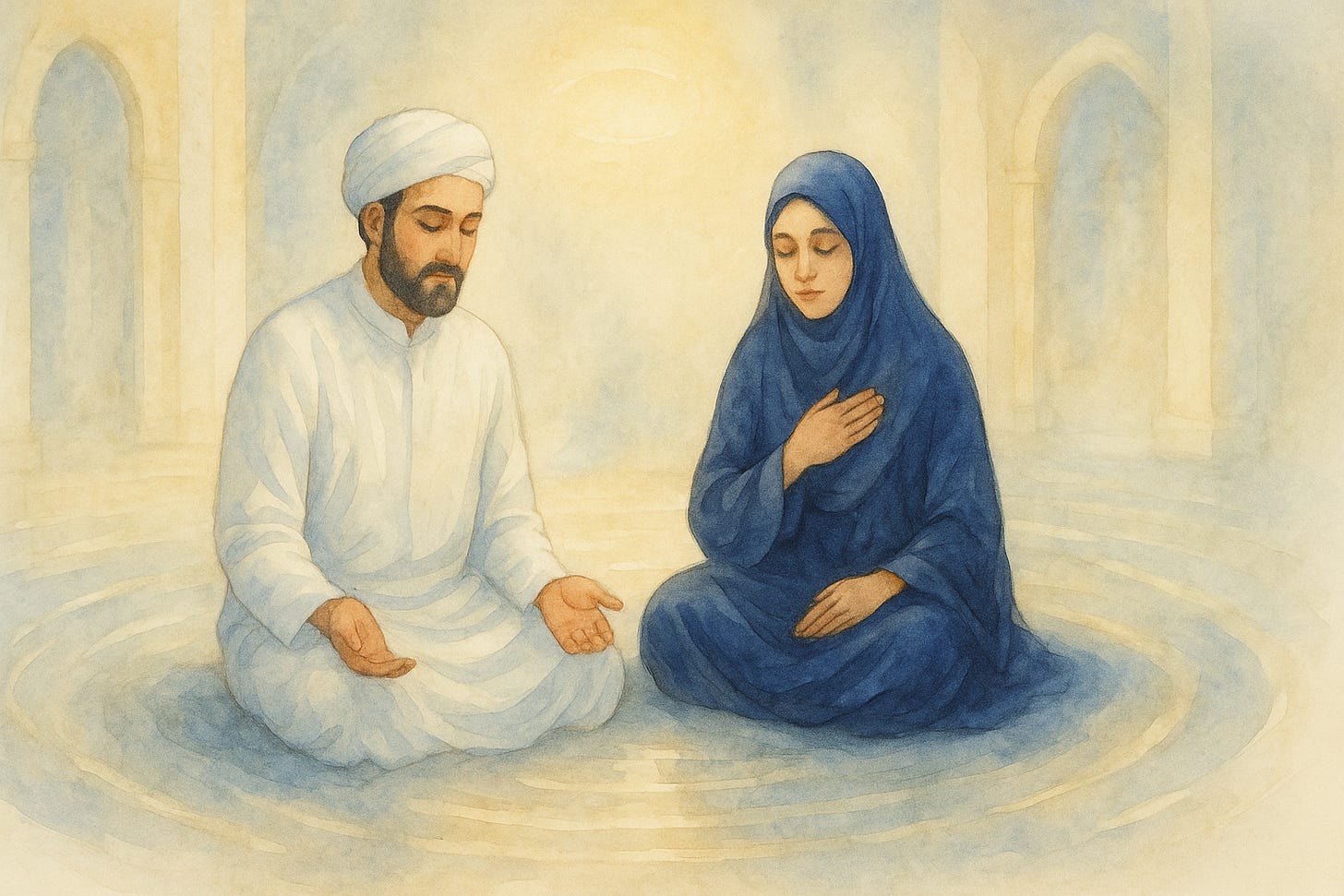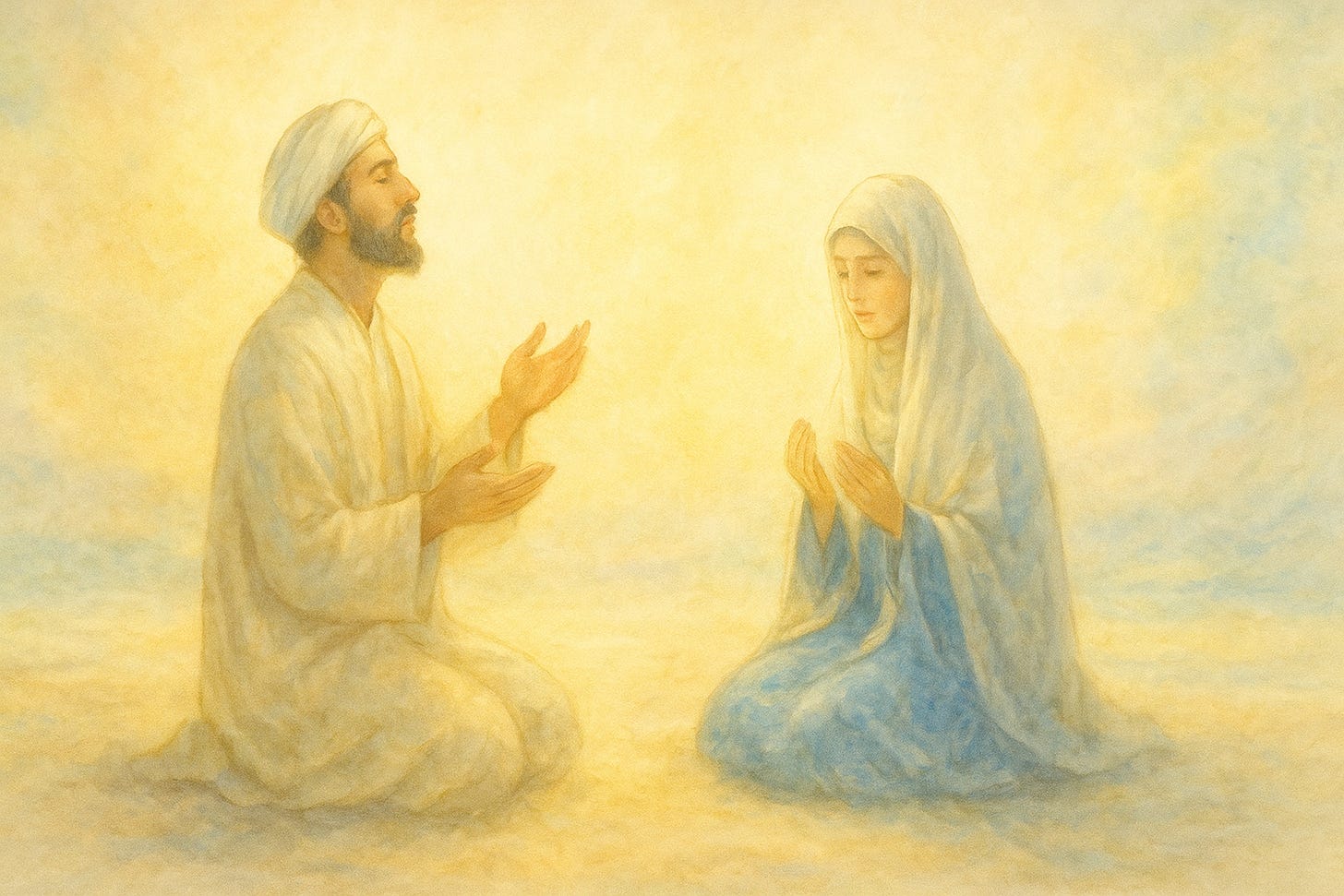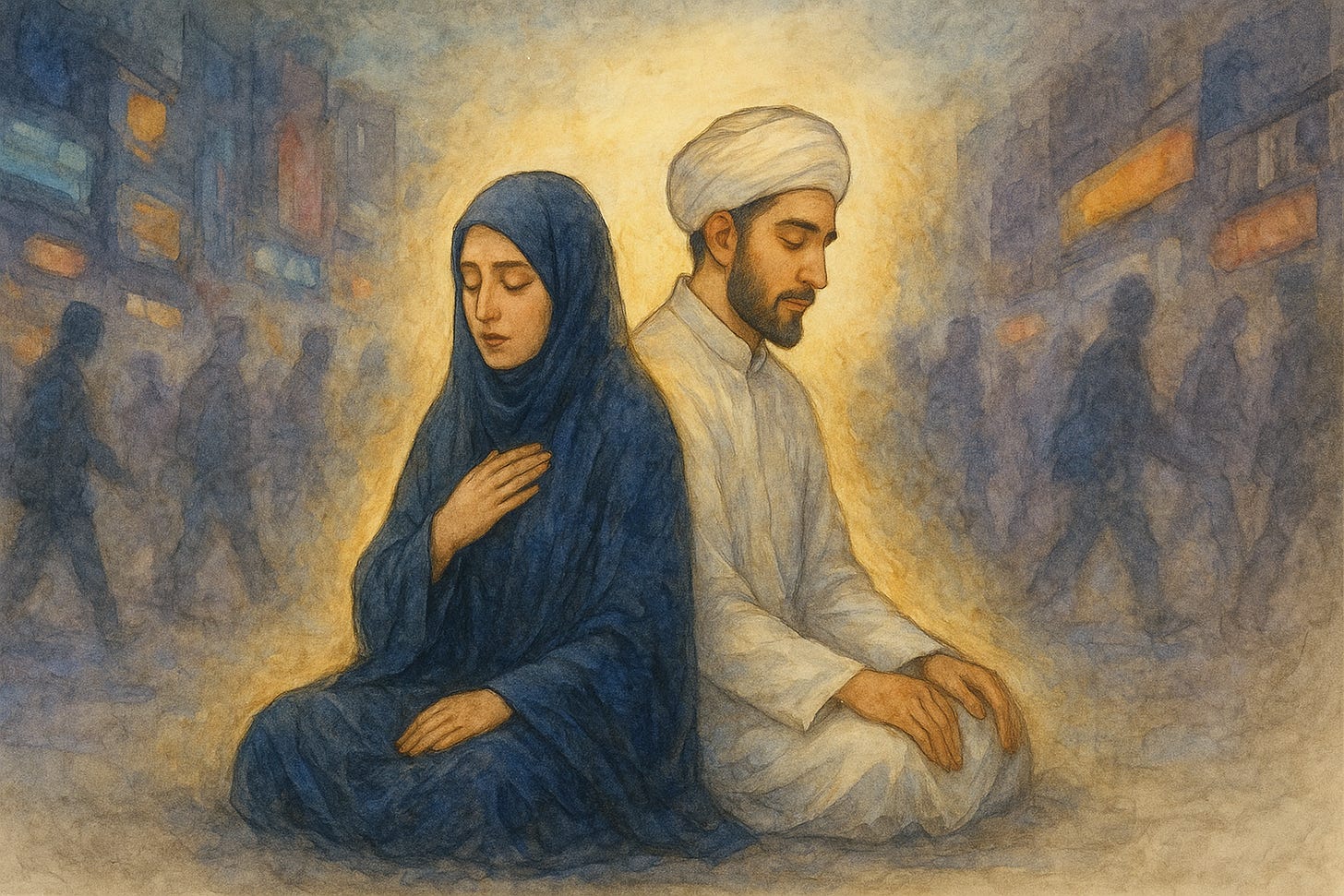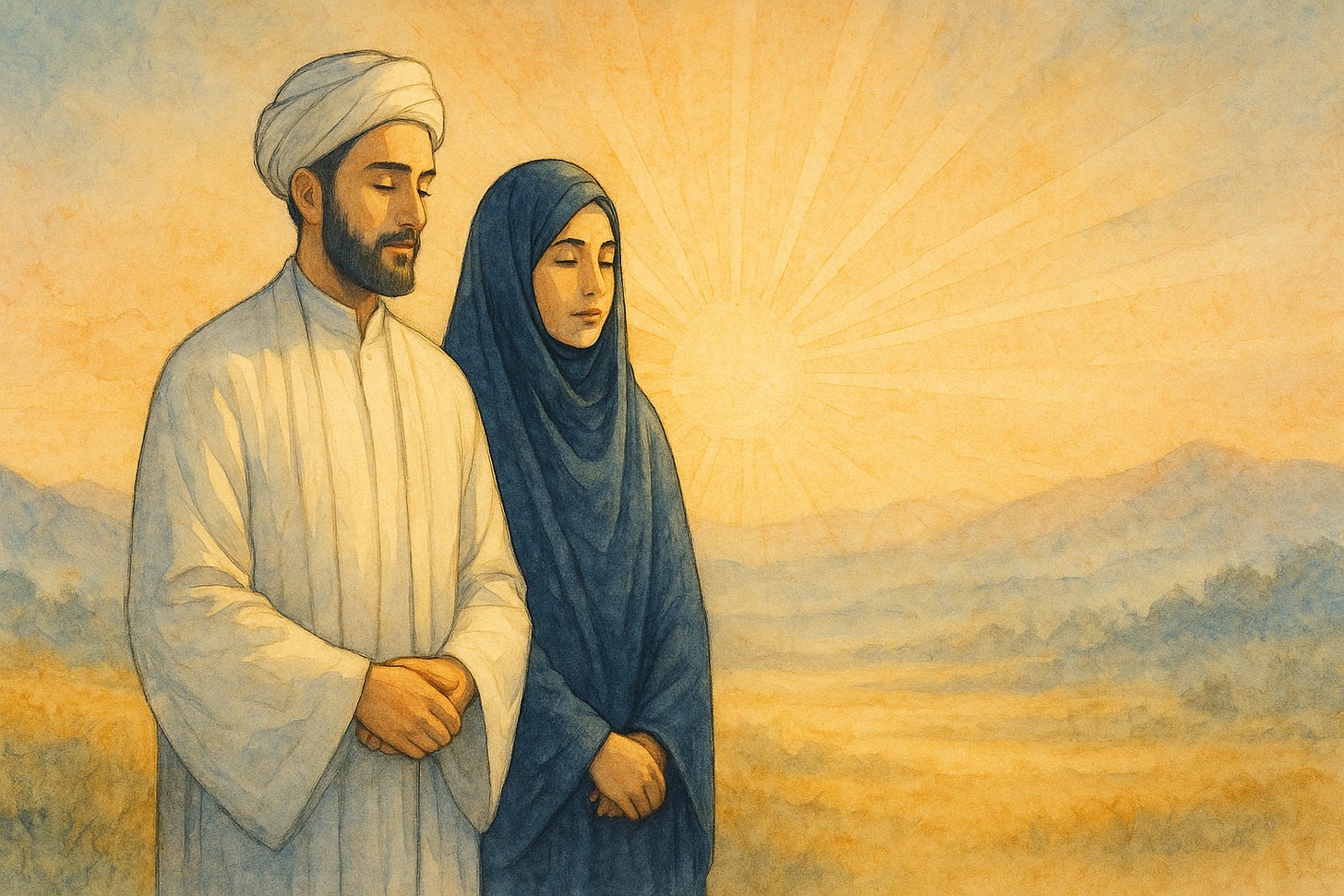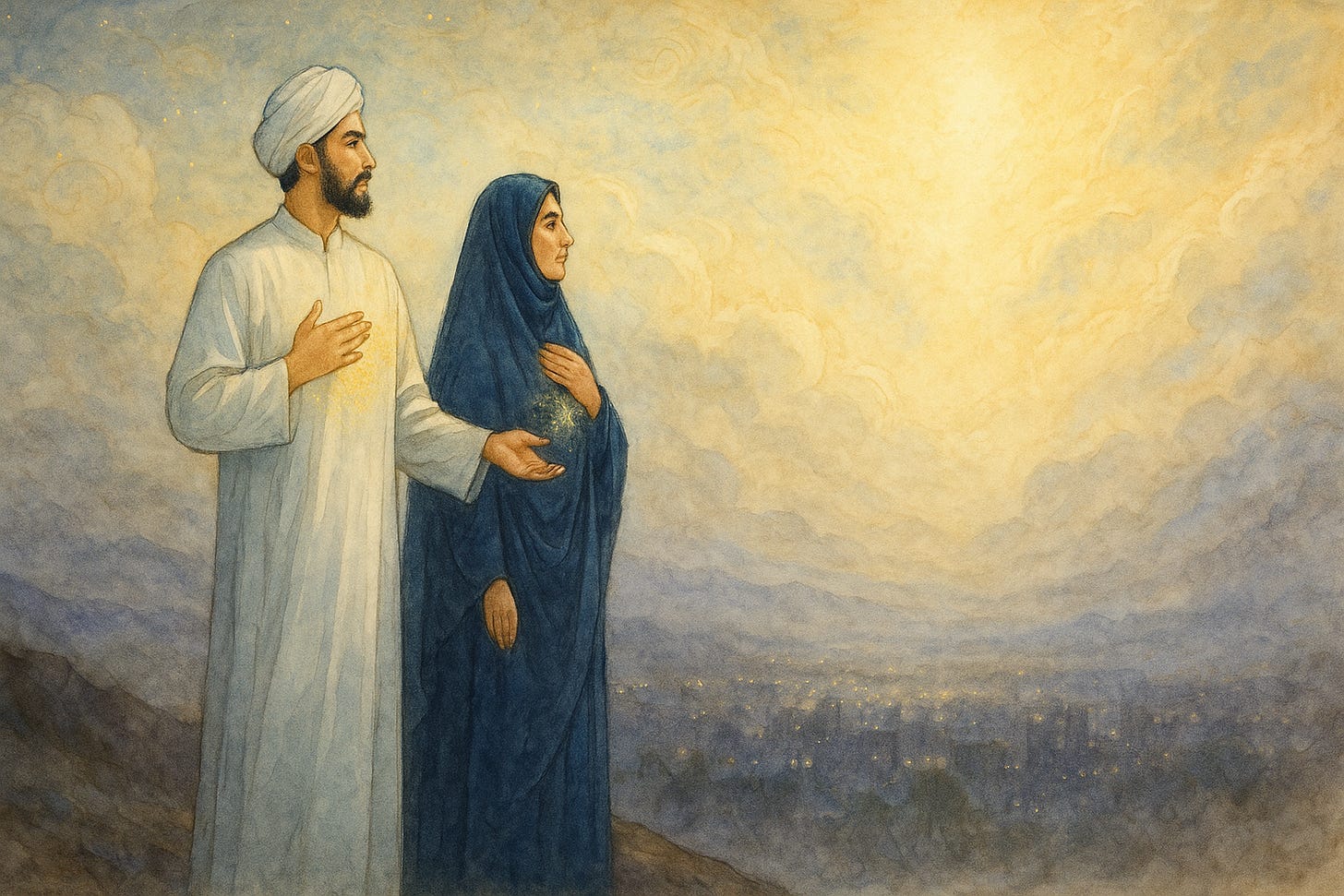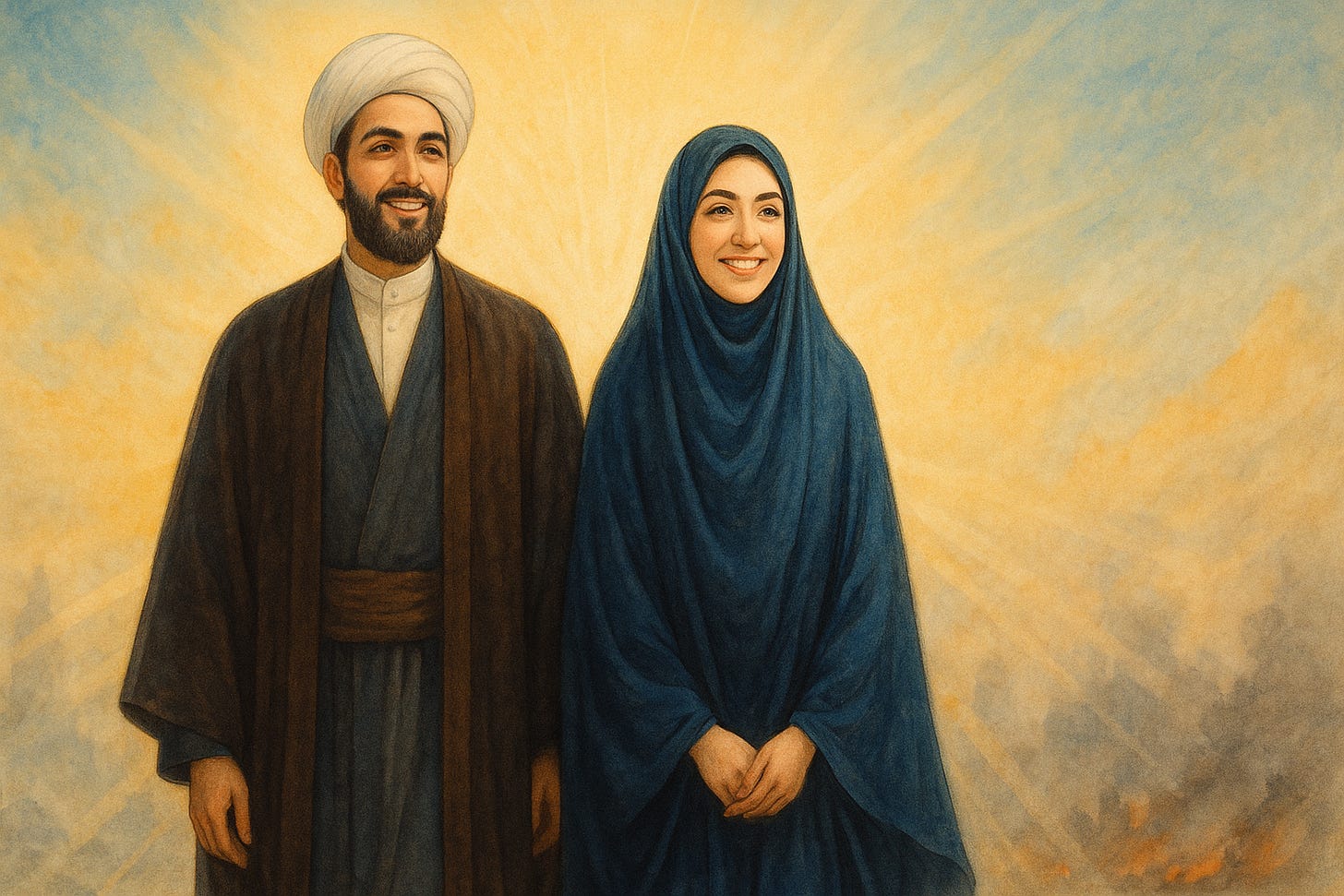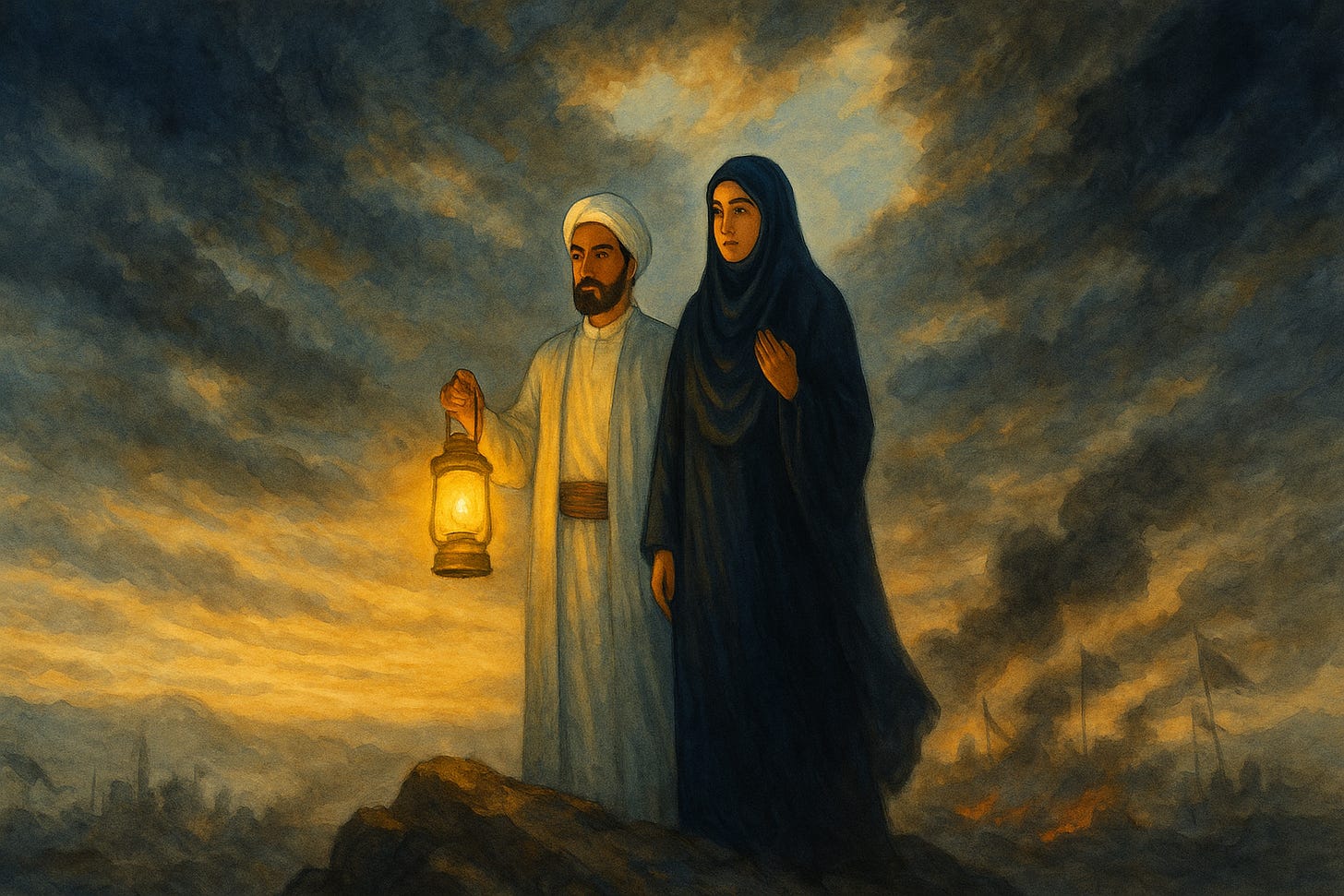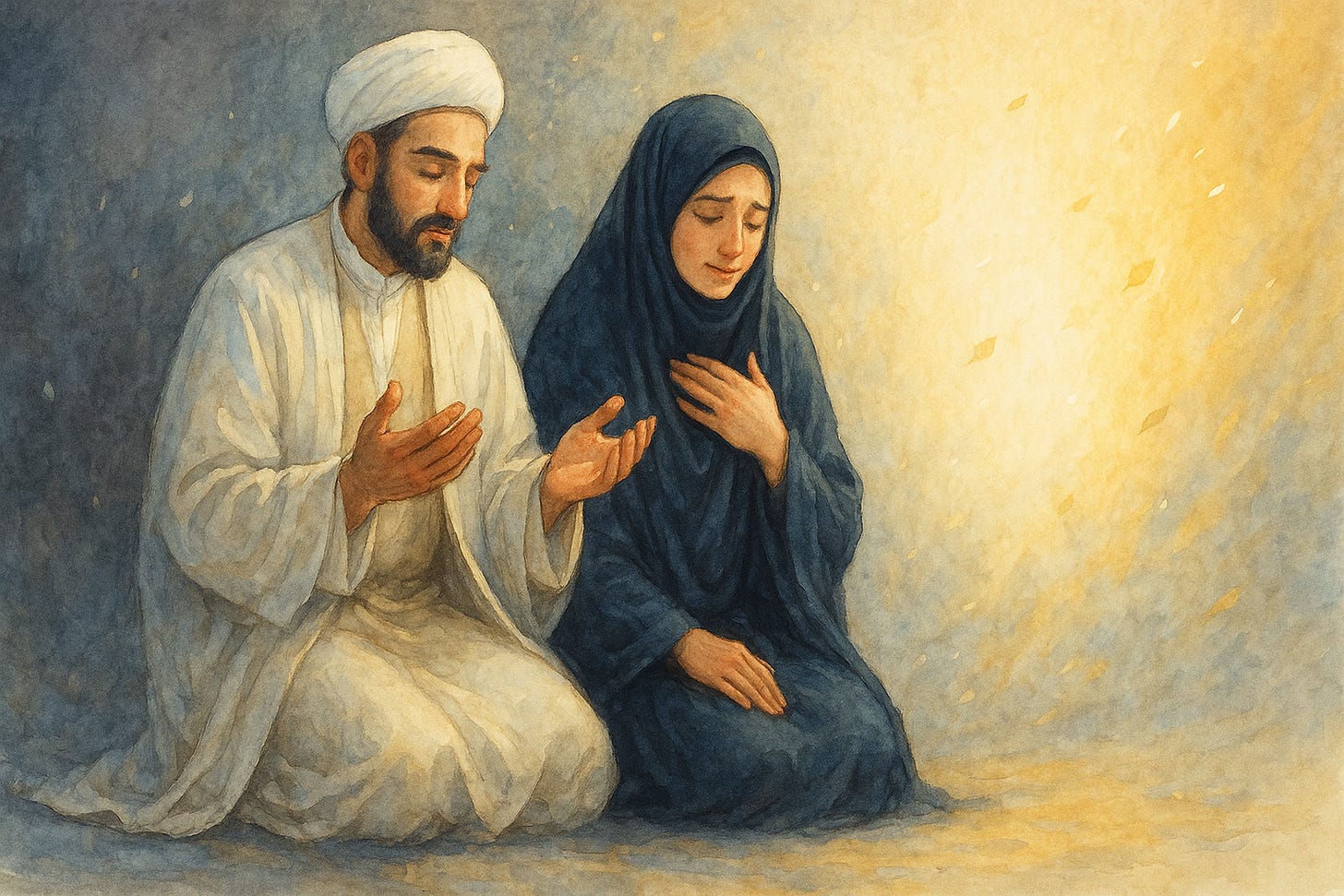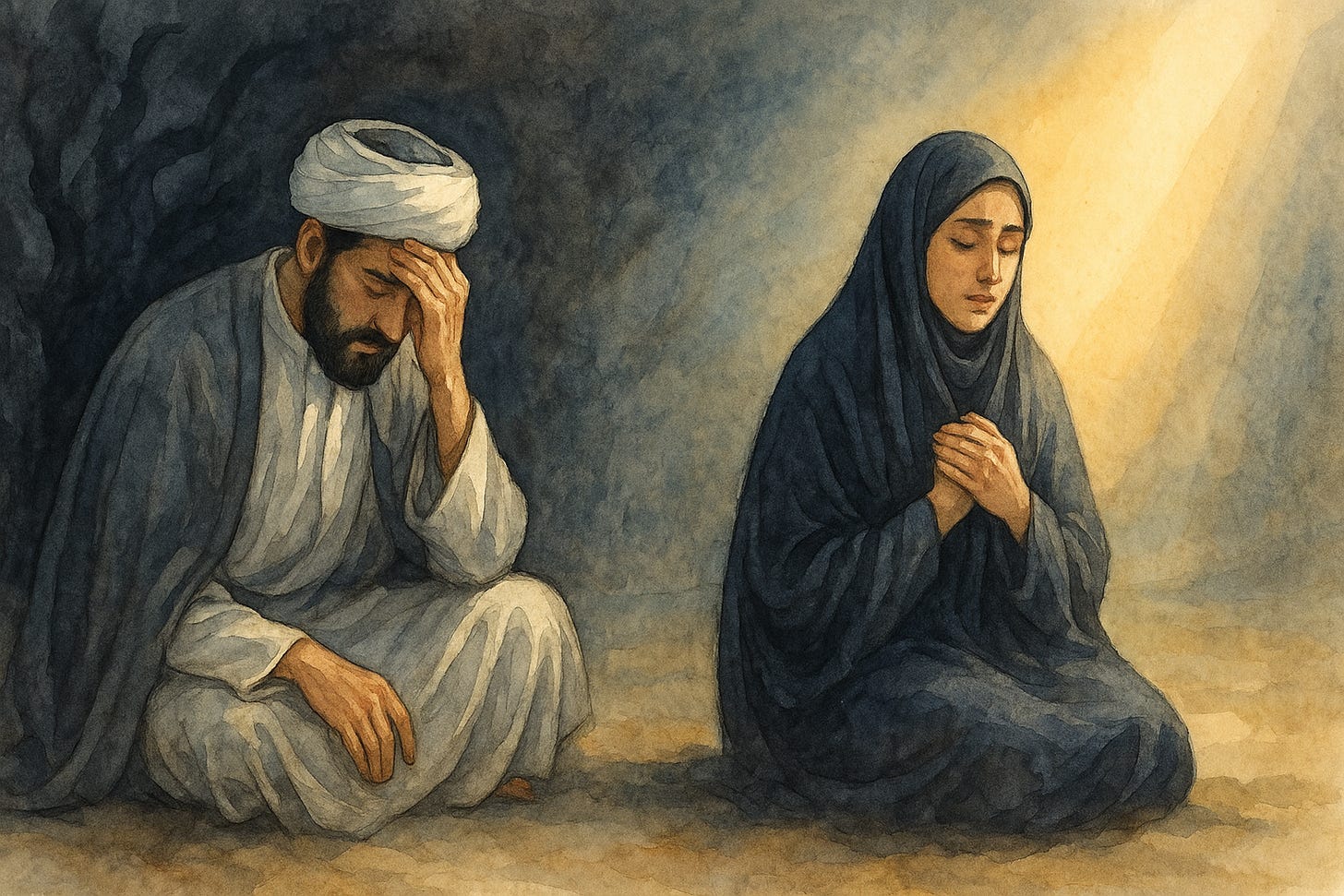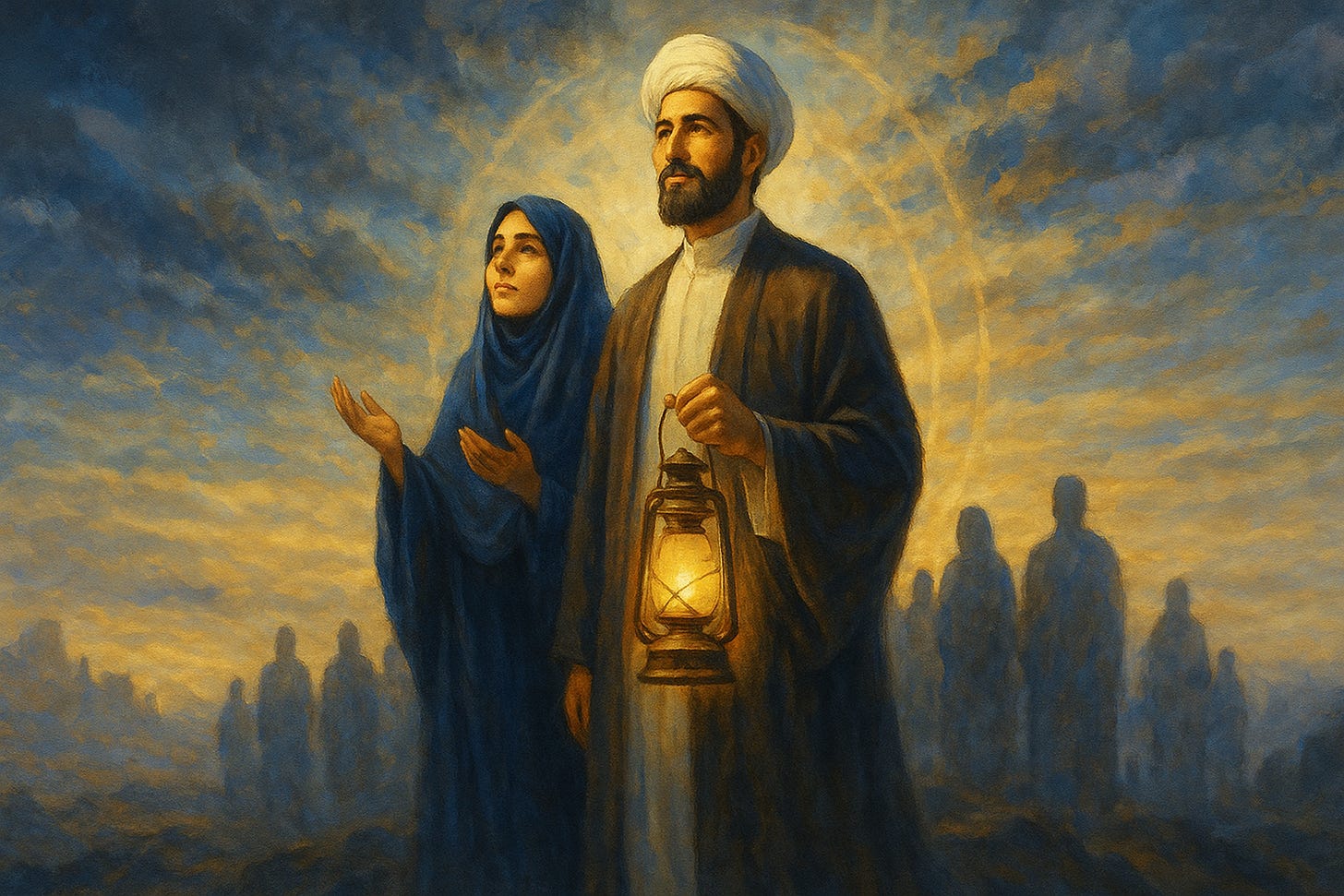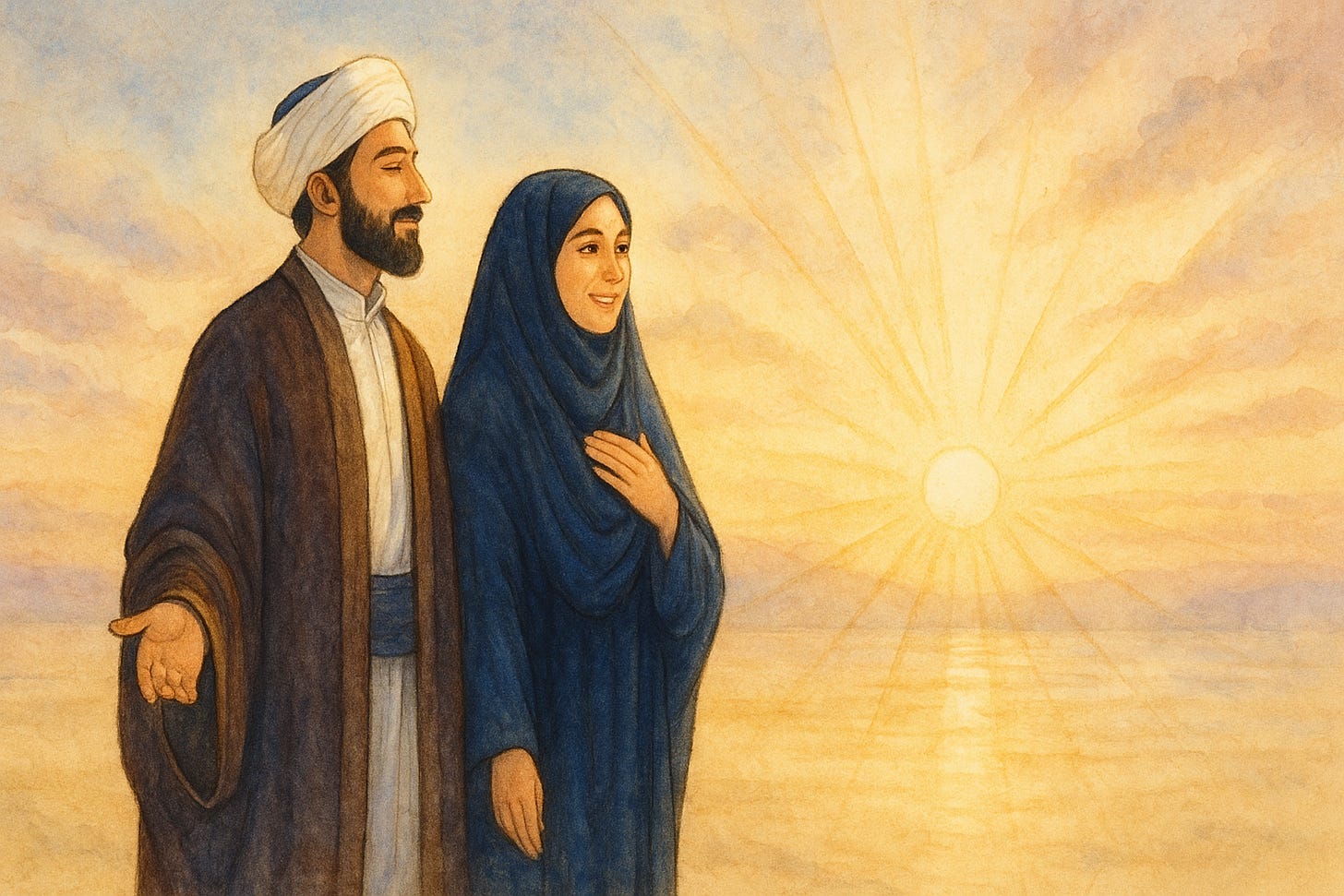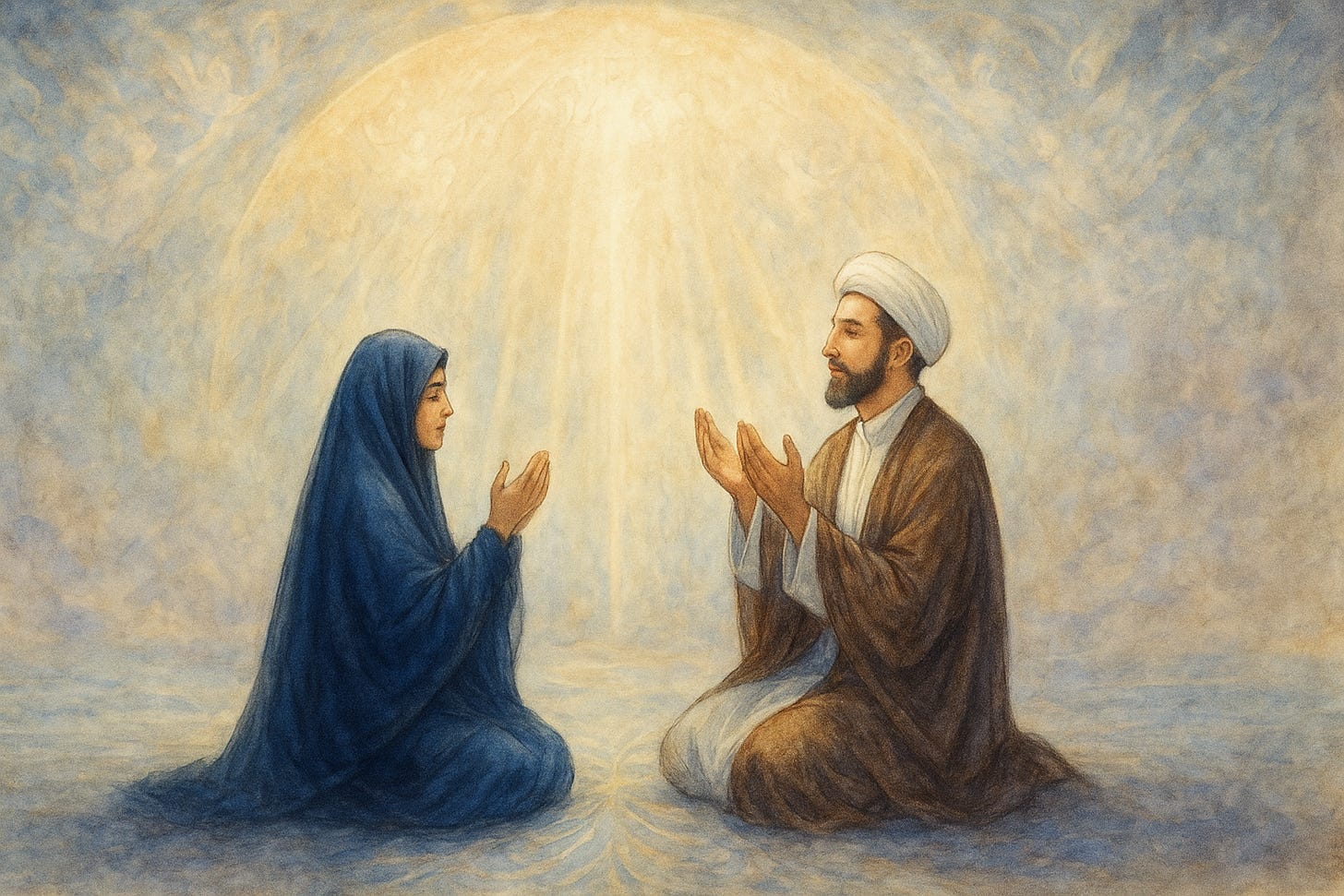[22] The Art of Supplication - The Heart of the Matter - Part 2 - The Axis of Supplication (Yaqin)
A series of discussions based on the book Uddat al-Dai wa Najah as-Saee - The Provision of the Supplicant, and the Triumph of the Seeker by Ibn Fahd al-Hilli on the subject of Supplication and Prayer.
In His Name, the Most High
This is the twenty-second part of our series, The Art of Supplication, an ongoing exploration into the sacred relationship between the supplicant, the supplication, and the Divine.
The insights within this series are cumulative, and the nature of our discussion requires that each part build upon foundations laid in the ones that came before.
To prevent any misunderstanding and to fully benefit from the depth of this subject, it is essential that you engage with the previous parts in order before continuing with this one.
The previous parts in this series can be found here:
Video of the Majlis (Sermon/Lecture)
This write up is a companion to the video majlis (sermon/lecture) found below:
Audio of the Majlis (Sermon/Lecture)
This write up is a companion to the audio majlis (sermon/lecture) found below:
Recap
The Heart of the Matter: The Prerequisite of Purity (Tazkiyah & Taharah)
In the first part of this new sub-series - the Heart of the Matter — we laid the foundational “prayer before the prayer.”
We established that before we can even ask, we must first be in a state of purity.
Our journey unfolded in three distinct movements:
From Taharah to Tazkiyah (The Garment and the Self):
We began with the Qur’anic imperative for success: Tazkiyah, the purification of the self (Surah al-Shams). We connected this to the command to “purify your garments” (Surah al-Muddaththir).1 Following Allamah Tabataba’i, we understood “garments” not just as cloth, but as our external conduct and inner nafs.
Our Lesson: To elevate wudhu from a robotic habit to a conscious adab (etiquette), intending, as Imam Khomeini guided, to wash our senses of all “other-than-God.”
Our Call to Clarify: To reject and expose the “superficial purity” of the modern age—from corporate “greenwashing” to the “whitewashing” of genocide—and to challenge the Khawarej mindset that obsesses over external piety while ignoring the heart’s najasa. We contrasted this with the “95% spiritual work” of the resistance, which proves that true taharah is the purification of intention.
From Body to Heart (The Qalb Tahir):
We then shattered the comfort of ritualism with the stark hadith of Imam al-Sadiq: “No purification is accepted without a pure heart.” This established that the heart validates the limbs, not the other way around.
Our Lesson: To perform an “internal wudhu” against the spiritual filth of envy (hasad) and arrogance (kibr). We took Ayatullah Bahjat’s practical cure for envy: to force ourselves to make dua for the person we envy.
Our Call to Clarify: To transform our communities from a state of takfir (condemning others) to one of istighfar (seeking forgiveness for oneself), understanding that this is the internal state that separates a true mujahid from a mere fighter.
From Humility to Nothingness (Khushu’ & Faqr):
Finally, we defined the state of the pure heart as Khushu’ (humility), the “key to prayer” (Imam Ali) and the “heart’s prostration” (Ayatullah Jawadi-Amoli). We then dug to its root cause: the intellectual and spiritual realisation of our Faqr (ontological poverty) before God (Surah al-Fatir). Following Mulla Sadra, we defined this as our very existence being a “linking” one (al-wujud al-rabit), a mere “ray of His light.”
Our Lesson: To wage relentless war on ’ujb (self-admiration), using Ayatullah Misbah-Yazdi’s tool: remembering that every perfection we possess is “borrowed” (’ariyat).
Our Call to Clarify: To identify the satanic arrogance of the modern world (”I am better”) as the true engine of all oppression. We linked this to Surah al-Asr, concluding that only the one who has realised their faqr can possess the true Sabr (steadfastness/resistance) required to enjoin the Truth.
We concluded with a practical summary and our first supplication, “A Whisper of Poverty and Purification,” setting the stage for our the next session, this one.
In His most beautiful name, we proceed …
The Heart of the Matter - Part 2 - The Axis of Supplication (Yaqin)
In the first part of our series, we laid the essential foundation for our journey to God. We explored the prerequisites of purity, learning that the path begins with Tazkiyah, the purification of our inner self and outer conduct.
We learned from Imam al-Sadiq that this outer purification is only accepted by way of a Qalb Tahir (a Pure Heart), one cleansed of the spiritual filth of envy, malice, arrogance and other such vices.
This journey culminated in the state of Khushu’ (Humility), the heart’s prostration, which we found was the natural, effortless result of realising our own Faqr (Ontological Poverty). We discovered, through the wisdom of Mulla Sadra, that we are not beings who need God, but beings whose very existence is our need for Him—a “linking existence” (al-wujud al-rabit), a mere “ray of His light.”
We have, in essence, prepared the vessel. We have purified the mirror of the heart from the rust of sin and the dust of heedlessness.
Now, we must ask: what is the substance that fills this vessel?
What is the light that this mirror is meant to reflect?
If Purity and Humility are the clean, fertile soil, then our subject today, Yaqin (Certainty), is the mihwar—the axis—of the entire plant.
It is the unshakeable spiritual backbone that connects the root of our poverty (faqr) in the dark earth to the sun of God’s Absolute Mercy and Truth (al-Haqq).
The Four Pillars of Certainty: The Intellectual Foundation
The Core Concept: What is Yaqin?
We begin by establishing a critical distinction.
In the contemporary world, “certainty” is often confused with a blind, rigid, or inherited dogma. It is seen as the opposite of intellect.
But in the gnostic and intellectual tradition of the Ahl al-Bayt, true Yaqin is not the enemy of the intellect; it is the highest achievement of the intellect, a profound spiritual and intellectual attainment.
The Qur’an itself introduces yaqin as the defining characteristic of the muttaqin (the God-conscious) at the very beginning of its guidance:
...وَبِالْآخِرَةِ هُمْ يُوقِنُونَ
“...and of the Hereafter they are certain.”
— Qur’an, Surah al-Baqarah (the Chapter of the Cow) #2, Verse 4
In his Tafsir al-Mizan, Allamah Tabataba’i explains that the Qur’an’s specific use of yaqin here, rather than just iman (faith), signifies a higher station.
He defines yaqin with precision:
وَالْيَقِينُ هُوَ الاِعْتِقَادُ الْجَازِمُ الَّذِي لَا يَتَطَرَّقُ إِلَيْهِ رَيْبٌ
“And yaqin is the firm belief (al-i’tiqad al-jazim) which no doubt (rayb) can penetrate.”
— Allamah Tabataba’i, Tafsir al-Mizan, commentary on Surah al-Baqarah (the Chapter of the Cow) #2, Verse 4
It is a form of seeing reality, not just believing in it.
This certainty in the akhira (hereafter) is what reorients the believer’s entire life.
If yaqin is the goal, how do we build this unshakeable structure?
The Commander of the Faithful, Imam Ali ibn Abi Talib, provides the complete blueprint. When asked about faith, he explained that yaqin itself stands on four pillars:
الْيَقِينُ عَلَى أَرْبَعِ شُعَبٍ: عَلَى تَبْصِرَةِ الْفِطْنَةِ، وَتَأَوُّلِ الْحِكْمَةِ، وَمَوْعِظَةِ الْعِبْرَةِ، وَسُنَّةِ الْأَوَّلِينَ
“Certainty rests on four pillars: insightful discernment, the interpretation of wisdom, admonition born of reflection, and the established way of those who came before.”
— Al-Kulayni, Al-Kafi, Volume 2, Page 51, Hadith 3 (also Nahjul Balagha, Saying 31)
This is a revolutionary framing.
Yaqin is not a passive state; it is an active process—the fruit of sustained work:
Insightful discernment: To see with fiṭnah1—keen, penetrating acuity that looks beyond the surface.
The interpretation of wisdom: Not merely to read hikmah, but to practice ta’wil—to return wisdom to its ultimate meaning and grasp its deepest implications.
Admonition born of reflection: To treat the events of the world (ʿibrah) as a living sermon (mawʿidhah), to recognise the “signs on the horizons and within ourselves.”
The established way of those who came before: To root our practice in the sunnah—the proven path of the Prophets and Imams who embodied yaqin.
Yaqin, therefore, is the only possible outcome for a heart that is both pure — as we discussed in our previous session — and intellectually sincere.
Lessons for the Present: The Inward Lesson: From Knowledge to Practice
The practical lesson from Imam Ali’s definition is profound: we are commanded to build our certainty. We must graduate from a “faith of inheritance” (iman al-wiratha)—a faith we hold simply because our parents did—to a “faith of investigation” (iman al-diraya).
We cannot hope to have the yaqin of Imam Ali if we are not willing to do the work of Imam Ali.
This ‘work’ forms a spiritual curriculum.
However, a crucial caveat must be made: this journey of deep study, especially into the ocean of Qur’anic tafsir and hadith, must be undertaken with humility.
It is essential to be connected to a righteous and learned scholar (alim rabbani).
This does not mean one cannot read independently, but it means having access to a guide who can clarify misunderstandings, dispel confusions, and prevent the dark pathways of misinterpretation.
We must approach this study by saying to our guide,
“I am studying this topic; may I come to you for guidance and clarification?”
This connection is the safeguard for our sincerity.
Our spiritual ‘curriculum’ is to actively engage these four pillars:
Pillar 1: Insightful Discernment
This is a call for deep study.
We must dedicate real, scheduled time to learning our faith.
This is not a casual pursuit, but the pursuit of perfection itself.
As Imam al-Baqir stated:
الْكَمَالُ كُلُّ الْكَمَالِ التَّفَقُّهُ فِي الدِّينِ
“Perfection, all of perfection, is to gain deep understanding (tafaqqah) in the religion.”
— Al-Kulayni, Al-Kafi, Volume 1, Page 32, Hadith 4
This means engaging in deep study of the Qur’an with a reliable tafsir like al-Mizan, and studying the foundational hadith of the Ahl al-Bayt from sources like al-Kafi.
Pillar 2: The Interpretation of Wisdom
This is a call to think.
We must stop being passive receivers of information and start connecting the concepts.
This act of reflection (tafakkur) is the engine of insight, a form of worship in its own right, as famously narrated from the Prophet and from Ahl al-Bayt:
تَفَكُّرُ سَاعَةٍ خَيْرٌ مِنْ عِبَادَةِ سَبْعِينَ سَنَةً
“One hour of reflection is better than seventy years of worship.”
— Bihar al-Anwar, Volume 68, Page 327
This is the tafakkur where we ask “why?”
This is the deep reflection where we ask “why?”
Why does the Qur’an link salah (prayer) and zakat (purifying alms)?
How does purity connect to justice in the world?
This process of deep interpretation, of tracing a concept back to its Divine source, is the very ta’awwul (interpretation) that Imam Ali spoke of.
It is this interpretive work that builds a robust, unshakeable worldview—one that is ours through active, guided investigation, not one that is merely inherited or passively accepted.
Pillar 3: Admonition Born of Reflection
This is a call to meditate on the signs of God.
We must observe the world—the fall of an oppressor, the resilience of a blade of grass, the precision of the cosmos—and see in it a sermon from God.
Imam Khomeini identified this as the key to unlocking gnosis:
بدان كه «تفكر» مفتاح ابواب معارف و خزائن كَمَالَات و علوم است... و موضوع آن... تفكر در آفاق و انفس است
“And know that tafakkur (reflection) is the key to the doors of ma’rifah (gnosis) and the treasures of perfections and knowledge... And its subject... is to reflect upon the ‘signs on the horizons and within yourselves’ (Qur’an, Surah al-Fussilat (the Chapter of the Clearly Explained) #41, Verse 53)”
— Imam Khomeini, Sharh-e Chehel Hadith (An Exposition of Forty Hadith), Hadith 5
This is how we take a lesson (’ibra) that points directly to His Power, Wisdom, and Mercy.
Pillar 4: The Established Way of Those Who Came Before
This is a call to anchor ourselves in sacred history.
When our own yaqin wavers, we look to the yaqin of the ‘ones who came before’—the established way of the Prophets of God, especially Prophet Muhammad and the Ahl al-Bayt.
We study their lives to gain a fraction of the certainty that led Imam Ali to his famous declaration:
لَوْ كُشِفَ الْغِطَاءُ مَا ازْدَدْتُ يَقِينًا
“Even if the veil (covering the unseen) were to be lifted, it would not increase my certainty.”
— Bihar al-Anwar, Volume 40, Page 153
We must study the life of Imam Husayn at Karbala, or Imam Khomeini in his exile, who faced impossible odds with this same serene and absolute certainty in the Divine promise.
Their yaqin becomes our fuel.
Call to Clarify: The Outward Call: From Practice to Proclamation
A society that lacks yaqin is a society that runs on doubt.
It is a culture of perpetual anxiety, ephemeral trends, and mass-produced propaganda.
The modern world, through its 24-hour news cycles and relentless marketing, manufactures a state of doubt and inadequacy—doubt in truth, doubt in ourselves, doubt in God—in order to sell us products and ideologies.
Into this chaos, the takfiri mindset (which we critiqued in our previous session) offers a false solution: a “certainty” that is not yaqin but a rigid, brittle, and fearful dogma.
It is the ‘certainty’ of the khawarej.
It is a ‘certainty’ so weak that it fears questions, fears the intellect, and must shout to convince itself of its own truth.
It is not built on “insightful discernment.”
Our “Call to Clarify” is to reject this false dichotomy.
We must clarify that the true yaqin of the Ahl al-Bayt is the very opposite.
It is not brittle; it is robust.
It is not fearful; it is confident.
A community built on the four pillars of Imam Ali welcomes intellectual engagement, thrives on “the interpretation of wisdom,” and produces scholars, philosophers, and gnostics, not just slogan-shouting zealots.
This intellectually-grounded yaqin is the first step in inoculating our communities against both the propaganda of the materialist west and the dogma of the literalist extremist.
It is the foundation of a faith that cannot be shaken.
The State of Certainty: From Request to Witness
The Core Concept: What Does Yaqin Feel Like?
If our first point was the intellectual blueprint for yaqin—the four pillars that form its structure—our second point is the experience of it.
What does it feel like to inhabit this state?
What is the tangible, spiritual quality of a heart that possesses yaqin?
First, we must understand its station.
Yaqin is not merely an optional upgrade to faith; it is its very perfection. Imam Ja’far al-Sadiq defines it with ultimate clarity:
الْيَقِينُ الْإِيمَانُ كُلُّهُ
“Certainty is faith in its entirety.”
— Al-Kulayni, Al-Kafi, Volume 2, Page 52, Hadith 4
This is a staggering statement.
It implies that anything less than yaqin is an incomplete faith.
This is the goal we are striving for.
But how does this state manifest?
Imam Khomeini, in his gnostic writings, describes it, not as a thought, but as a form of vision. He explains that it is the direct fruit of purifying the heart (as we learned in the previous session) and then filling it with remembrance (dhikr).
He writes in his Sharh-e Chehel Hadith (An Exposition of Forty Hadith):
پس از آنكه باطن انسانى صفا پيدا كرد... كم كم حقايق غيبى ملكوتى در آن منعكس شود، و «يقين» حاصل آيد و حقايق به درجه «عيان» برسد
“Therefore, after the human interior finds purity... little by little, the unseen realities of the spiritual kingdom (malakut) are reflected in it, and yaqin is obtained, and the realities reach the station of vision (’ayan).”
— Imam Khomeini, Sharh-e Chehel Hadith (An Exposition of Forty Hadith), Hadith 1
This is the “rabbit hole.”
Yaqin is the state where the unseen becomes manifest. The heart, once polished, becomes a mirror that reflects the realities of the unseen spiritual kingdom.
As Imam Khomeini explains, this light of faith can become brighter than any physical light:
در اين مقام، حقايق توحيد... بر قلبش منكشف گردد... گاه شود كه از نور خورشيد در وسط النهار، روشنتر گردد.
“In this station, the realities of Tawhid (Oneness)... are unveiled to his heart... It may be that it becomes brighter than the light of the sun in the middle of the day.”
— Imam Khomeini, Sharh-e Chehel Hadith (An Exposition of Forty Hadith), Hadith 21 (Commentary on Riya’ (Ostentation))
The late, great scholar Ayatullah Sayyed Muhammad Husayn Fadhlullah provides the final, beautiful synthesis of what this state does to our prayer.
If the unseen is now seen, and the heart is in a state of reflection, our relationship with God is fundamentally altered.
In his commentary on supplication, he explains this transformation:
إنَّ اليقين يحوّل الدعاء من طلبٍ إلى حديث
“Indeed, Certainty (yaqin) transforms supplication (dua’) from a request (talab) to a conversation (hadith).”
— Ayatullah Sayyid Muhammad Husayn Fadhlullah, Fi Rihab Du’a Kumayl (In the Realms of Du’a Kumayl)
This is the ultimate transformation.
The prayer is no longer a desperate plea to a distant or absent God.
It is a confident, intimate, and continuous conversation with a reality that is more present to us than we are to ourselves.
Lessons for the Present: The Inward Lesson: Polishing the Heart’s Mirror
The practical lesson flows directly from Imam Khomeini’s guidance: if yaqin is the fruit, dhikr (remembrance) is the labour.
But we must redefine our understanding of dhikr.
It is not the robotic tallying of beads or the mindless repetition of words.
It is the act of polishing the mirror of the heart.
Our lesson is to engage in conscious, prolonged remembrance.
The Practical Application
When we set aside time for dhikr, we must bring our full presence.
We must understand that with every “Ya Allah” (O God) or “Subhan’Allah,” (Glory by to God) we are performing the action of polishing. We are actively wiping away the dust of ghaflah (heedlessness) that has settled on our heart.
The Goal
The goal is to polish the mirror so relentlessly that, as Imam Khomeini said, the “unseen realities” must be reflected in it.
The Result
When we achieve this, our dua’ changes.
We no longer begin our prayer by trying to “find” God.
Because of our constant state of remembrance, we are already in a “state of dialogue.”
Our prayer is simply the continuation of a conversation that never stopped.
We move from a state of requesting (talab) to a state of witnessing (shuhud).
Call to Clarify: The Outward Call: Resisting the Age of Heedlessness
We live in a world that is engineered for ghaflah (heedlessness).
This is the core malady of our time.
It is a “society of the spectacle,” a culture of frantic noise, digital distraction, and sensory overload.
This entire system is designed for one purpose: to keep us obsessed with the material, superficial world (dunya) and completely blind to the unseen, profound realities of the Hereafter (akhira).
It is a system that manufactures doubt and anxiety as its primary products.
Our “Call to Clarify” is to proclaim that dhikr and the yaqin that results from it are, in this context, radical acts of resistance.
The Clarification
The person who has achieved yaqin—who is in a constant “state of dialogue” with God—is the sanest, most grounded, and most revolutionary person in an insane and superficial world.
The Transformation
They are no longer a mere “consumer,” driven by manufactured anxieties.
They are a mu’min (a true believer), driven by profound realities.
They are no longer a slave to the “spectacle,” because their heart is a mirror reflecting the malakut (the spiritual kingdom).
The Conclusion
This is why the forces of taghut (tyranny) work so hard to fill our eyes and ears with noise—because they fear a society of believers who have yaqin.
A person with certainty cannot be manipulated by fear, greed, or propaganda.
They have an unshakeable axis.
They are, in a word, free.
Certainty in Action: The Weapon of Resistance
The Core Concept: What Does Yaqin Do?
Now we arrive at the critical, final stage: what does yaqin do when it is put under pressure?
How does it function not just in the peace of our prayer room, but in the chaos and struggle of the world?
This is where yaqin meets sabr (steadfastness)—the key component of Surah al-Asr:
وَالْعَصْرِ
إِنَّ الْإِنْسَانَ لَفِي خُسْرٍ
إِلَّا الَّذِينَ آمَنُوا وَعَمِلُوا الصَّالِحَاتِ وَتَوَاصَوْا بِالْحَقِّ وَتَوَاصَوْا بِالصَّبْرِ“By time!
Indeed, mankind is in loss,
Except for those who believe and do righteous deeds, and enjoin each other to truth (al-haqq), and enjoin each other to patience/steadfastness (al-sabr).”—Qur’an, Surah al-Asr (the Chapter of the Time) #103, Verses 1-3
The command from the Prophet Muhammad is precise:
ادْعُوا اللَّهَ وَأَنْتُمْ مُوقِنُونَ بِالْإِجَابَةِ
“Call upon God while you are certain of the response.”
— Al-Kulayni, Al-Kafi, Volume 2, p. 473, Hadith 3
This hadith presents a profound challenge.
How can we be “certain of the response” when we are so aware of our own sins, our own failings, our own unworthiness?
How can we be certain when we see injustice in the world and our prayers for its removal seem to go unanswered?
The answer is found in the heart-wrenching, yet profoundly certain, supplications of Imam al-Sajjad.
In his Dua (supplication) of Abu Hamzah al-Thumali, he masters this apparent contradiction.
He confesses his own nothingness and sinfulness, yet immediately pivots to an absolute certainty in God’s mercy:
إِلَهِي لَمْ أَعْصِكَ حِينَ عَصَيْتُكَ وَأَنَا بِرُبُوبِيَّتِكَ جَاحِدٌ... وَلَكِنْ خَطِيئَةٌ عَرَضَتْ... وَغَرَّنِي سِتْرُكَ الْمُرْخَى عَلَيَّ... فَالْآنَ مِنْ عَذَابِكَ مَنْ يُنْقِذُنِي؟... وَأَنَا بِكَ وَلَكَ عَائِذٌ إِلَهِي... لَا أَيْأَسُ مِنْكَ وَقَدْ فَتَحْتَ لِي بَابَ التَّوْبَةِ إِلَيْكَ
“My God, I did not disobey You when I disobeyed You as one who denies Your Lordship... but it was a sin that befell me... and I was deceived by Your veil drawn over me... So now, who will save me from Your punishment?... And I am seeking refuge in You and from You! My God... I do not despair of You, for You have opened the door of repentance to me.”
— Dua Abu Hamzah al-Thumali
This is the synthesis.
Our yaqin is not in ourselves, our deeds, or our worthiness.
Our yaqin is in Him.
It is an absolute certainty in His Mercy, His Generosity, and His Wisdom, precisely at the moment we are most aware of our own failings.
We are not certain of our desired outcome at our desired time.
We are certain that He is listening and that His response, whatever it is and whenever it comes, is the perfect manifestation of His wisdom and love.
Lessons for the Present: The Inward Lesson: Certainty in Mercy, Not in Deeds
The practical lesson is how we handle the whispers of Shaytan (Satan), especially when our prayers are “delayed” or when we fall into sin.
The Problem
We make dua for something, and it does not happen.
Or we commit a sin, and Shaytan whispers:
“Who are you to ask God for anything now? You are a hypocrite. Your connection is cut. Give up.”
The Solution
The yaqin of Imam al-Sajjad is the weapon against this despair.
Our lesson is to reject this satanic logic entirely.
This is not just a hopeful wish; it is a command based on the very nature of God as introduced to us by the Ahl al-Bayt.
Satan’s logic is a perversion of justice; it is a cold, merciless, and illusory calculus designed to lead to despair.
As Imam Khomeini explains in his Forty Hadith, this is Satan’s primary tactic:
وَ شَيْطَان... مَعْصِيَت را دَرْ نَظَرِ انْسان بُزُرْگ مىكُنَد... تا انْسان را بِه «يَأْس» اَز رَحْمَتِ حَقّ بِيَندازَد. ... وَ ايْن «يَأْس» اَز مَعْصِيَتى كِه كَرْدِه بالاتَر وَ عَظيمْتَر اَسْت.
“And Satan... makes the sin appear great in the person’s eyes... in order to cast the person into ‘despair’ (ya’s) of God’s mercy. ... And this ‘despair’ is higher and more grievous than the sin he has committed.”
— Imam Khomeini, Sharh-e Chehel Hadith (An Exposition of Forty Hadith), Hadith 11 (Commentary on Despair)
We, however, are commanded to argue from the logic of God’s true nature:
His all-encompassing mercy (rahmah).
We are given the proof of God’s true disposition in a profound hadith from Imam Ja’far al-Sadiq:
إِنَّ اللَّهَ عَزَّ وَ جَلَّ إِذَا تَابَ عَبْدٌ... يُنْسِي مَلَائِكَتَهُ مَا كَتَبُوا عَلَيْهِ مِنَ الذُّنُوبِ وَ يُوحِي إِلَى جَوَارِحِهِ وَ إِلَى بِقَاعِ الْأَرْضِ أَنِ اكْتُمُوا عَلَيْهِ ذُنُوبَهُ فَيَلْقَى اللَّهَ عَزَّ وَ جَلَّ حِينَ يَلْقَاهُ وَ لَيْسَ شَيْءٌ يَشْهَدُ عَلَيْهِ بِشَيْءٍ مِنَ الذُّنُوبِ
“Indeed, when a servant repents to God, the Most High... He makes his angels forget what they had written against him of sins. And He inspires his limbs and the spots of the earth (where he sinned) saying, ‘Conceal his sins from him.’ So he meets God, the Most High, when he meets Him, and there is nothing to bear witness against him regarding any of his sins.”
— Al-Kulayni, Al-Kafi, Volume 2, Page 436, Hadith 1
This hadith is our weapon.
Satan’s whisper—that the sin is too great and the connection is cut—is a lie.
The truth is that God’s mercy actively erases the sin, commands the angels to forget it, and orders the very earth to conceal it.
The Practical Application
We must cultivate a certainty that is based on His attributes, not our states.
When we feel sinful, we must run towards Him faster, with the certainty that His door of repentance is open.
When our dua (supplication) is not answered in the way we want, we must have the certainty that a better answer is being formulated—either by a trial being averted, a sin being forgiven, or a greater reward being stored for us.
We call upon Him with the certainty of a beloved child who knows their father is listening and loves them, even if they have misbehaved.
Call to Clarify: The Outward Call: Certainty as the Weapon of Resistance
This brings us to our final, most critical clarification.
In the world of geopolitics, oppression, and war, the primary weapon of the oppressor is not the bomb or the missile; it is despair.
It is the psychological warfare designed to convince the oppressed that their resistance is futile, that the enemy is too big, that God is (God forbid) absent, and that they are alone.
This is the ultimate link to Surah al-Asr.
وَالْعَصْرِ
إِنَّ الْإِنْسَانَ لَفِي خُسْرٍ
إِلَّا الَّذِينَ آمَنُوا وَعَمِلُوا الصَّالِحَاتِ وَتَوَاصَوْا بِالْحَقِّ وَتَوَاصَوْا بِالصَّبْرِ“By time!
Indeed, mankind is in loss,
Except for those who believe and do righteous deeds, and enjoin each other to truth (al-haqq), and enjoin each other to patience/steadfastness (al-sabr).”—Qur’an, Surah al-Asr (the Chapter of the Time) #103, Verses 1-3
God states that mankind is in loss, except for those who “enjoin each other to Truth, and enjoin each other to Sabr (patience/steadfastness/resistance).”
How can a small, besieged group “enjoin each other to sabr“ when facing a genocidal superpower armed with the most advanced technology on earth?
They cannot do it with material calculations.
They can only do it through yaqin.
This is the “hidden ideology” of the Resistance we spoke of in the previous session.
It is the practical, political, and military manifestation of a deeply nurtured spiritual yaqin.
We hear this directly from its leaders:
The Master of the Martyrs of the Islamic Resistance, Sayyed Hasan Nasrallah, famously said after the 2006 victory:
نحن لم نشك يوماً في النصر، لأننا لم نشك يوماً بالله
“We never doubted the victory, because we never doubted God.”
— Attributed to Sayyed Hasan Nasrallah (often cited in speeches and analyses of the 2006 war)
He has articulated this yaqin in other ways, explaining to the fighters that victory is not a possibility but a destiny:
لَمْ يَكُنْ يَوْمًا النَّصْرُ خِيَارًا بِالنِّسْبَةِ لَكُمْ، بَلْ هُوَ مَصِيرٌ حَتْمِيٌّ مَكْتُوبٌ عَلَى جِبَاهِكُمْ
“Victory was never an option for you; rather, it is an inevitable destiny written on your foreheads.”
— Attributed to Sayyid Hasan Nasrallah (from speeches to resistance fighters)
The martyred commander, Hajj Qasim Soleimani, embodied this principle.
His strength was not just tactical; it was spiritual.
He is reported to have said to his fighters:
نحن نتغذى على اليقين، لا على الراتب
“We are fed by certainty, not by salary.”
— Attributed to Hajj Qasim Soleimani (widely circulated anecdote)
This is the conclusion.
Their sabr is not a grim, passive endurance.
It is a joyful, offensive, and confident resistance.
It is born from an unshakeable yaqin that they are on the side of al-haqq (The Truth), and that God’s promise of victory is absolute.
This is what makes a small group of believers, armed with yaqin, more powerful than the greatest armies on earth.
Their yaqin, their certainty is their weapon.
Conclusion
The Journey from Doubt to Dialogue
In this second part of our journey into “The Heart of the Matter”, we have explored the profound station of yaqin, or certainty. We have moved from the foundation of purity to the axis of certainty.
Our path was a logical ascent:
We first learned that yaqin is an intellectual achievement, not a blind dogma. It is built on the “four pillars” defined by Imam Ali: insightful discernment, the interpretation of wisdom, admonition born of reflection, and following the path of the (righteous) ones who came before.
We then discovered that yaqin is an internal state of vision. It is the fruit of purifying the heart and polishing it with dhikr (remembrance), a state where, as Imam Khomeini said, the unseen becomes “brighter than the sun,” and dua’ is transformed from a “request to a dialogue.”
Finally, we saw that yaqin is both a defensive and proactive weapon. It is the weapon against Satan’s whisper of despair, allowing us to be certain of God’s Mercy even when we are aware of our sins. And it is the weapon of the Resistance, providing the unshakeable sabr (steadfastness) that makes believers, as the Martyr Sayyed Hassan said, an “inevitable destiny.”
As we leave this session, let us take three practical lessons:
Build Your Certainty: Dedicate time this week to one of the “four pillars.” Do not just read the Qur’an; pick one verse and reflect on it (Pillar 3). Do not just hear the news; interpret its deeper wisdom (Pillar 2). Actively build your faith.
Transform Your Remembrance: The next time you perform dhikr, do not just count. Feel the act. With each “Subhan’Allah,” intend that you are polishing the mirror of your heart, wiping away the film of heedlessness, preparing it to reflect the light of the unseen.
Wield Certainty Against Despair: The next time you sin and Satan whispers, “You are cut off,” reject his illusory logic. Remind yourself of Imam al-Sadiq’s hadith: that God’s mercy erases the record. Your certainty is in His mercy, not your merit.
We have now purified the vessel and filled it with the light of Certainty. But this vessel, our body, and this light, our soul, require fuel to be sustained in the world.
Join us for the third part of this series within a series, where we will explore the final, and perhaps most practical, prerequisite: “The Fuel for the Heart (Rizq Halal)”—the vital role of lawful and pure sustenance in keeping the mirror of the heart polished and the light of certainty burning bright.
Whispers Beneath The Throne
A Whisper for the Light of Certainty
In the Name of God, the Most Gracious, the Most Merciful.
O God, send Your blessings upon Muhammad,
Your chosen Beloved,
and upon his family,
the Ark of our salvation.My God,
I am the one who was mired in sin.
I am the one who was lost in the fog of my own doubt.
My heart was a mirror,
but it was caked in the rust of my transgressions and the dust of my heedlessness.I would call,
but I was not certain.I would ask,
but I did not know how to listen.I lived in a world of shadows and mistook them for reality.
Then, My Lord,
You enveloped me in Your profound love,
and You showed me the signs of Your Truth.I saw You in the mercy of Your Saints,
in the hadith of Your Imam, al-Sadiq,
who promised that You command the very angels to forget my sins,
that You order the earth to conceal my shame.I was certain of my sin,
but You taught me to be more certain of Your Mercy.I saw You in the steadfastness of the Resistance,
in the eyes of a fighter whose Sabr is not a grim endurance,
but a joyful, proactive and defensive weapon.I heard You in the voice of Your servant who said,
“We are fed by certainty, not by salary,”
and I knew that Yaqin was the true sustenance.I saw You, My God,
in the eyes of the children of Gaza,
in the tears of a father holding his martyred child,
who looks to the camera not with despair,
but with a defiant certainty, and says,
“Sufficient is God for us.”Their yaqin exposed the lie of the entire world.
Their steadfastness shattered my illusions.
Their poverty revealed my own.
O God,
O You,
the Light upon Light,
I am the one who was mired in sin,
and now I am the one who is mired in Your Love.Grant me,
I beg You,
a portion of this Certainty.Grant me the intellectual strength to build its pillars,
the spiritual purity to polish its mirror,
and the defiant courage to wield it as a weapon.Make my yaqin the axis of my soul,
So that my dua’ becomes a “dialogue” with You,
My sabr becomes a resistance in Your way,
And my life and my death become entirely for You.My God,
I pledge to You,
and I pledge to the Imam of my Time,
that I will strive to live by this Certainty.I will enjoin it,
and I will defend it.I will build my faith with knowledge,
and I will fight despair with Your Mercy.O God,
bless Muhammad and his family,
and hasten the return of our Master,
the Awaited One,
Imam al-Mahdi.Make us worthy of his sight.
Make us the dust beneath his feet.
Make our yaqin the foundation upon which his government of Justice is built.
By Your Mercy,
O You, the Most Merciful of the merciful.Amen, O Lord Sustainer of the Universes.
Amen, O Most Merciful of the merciful.
And from Him alone is all ability and He has authority over all things.
insightful discernment (fiṭnah, i.e., acuity—not fitnah ‘trial’)




